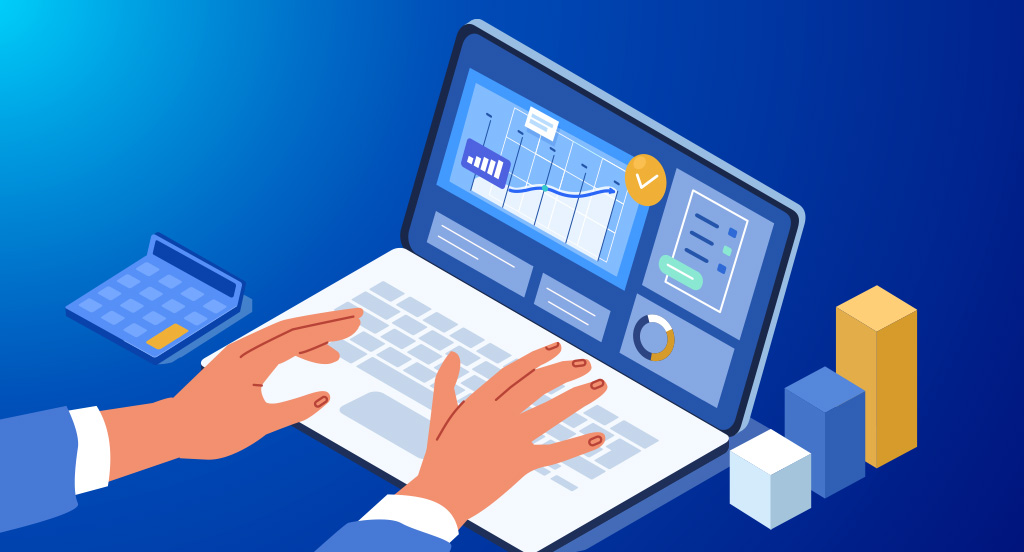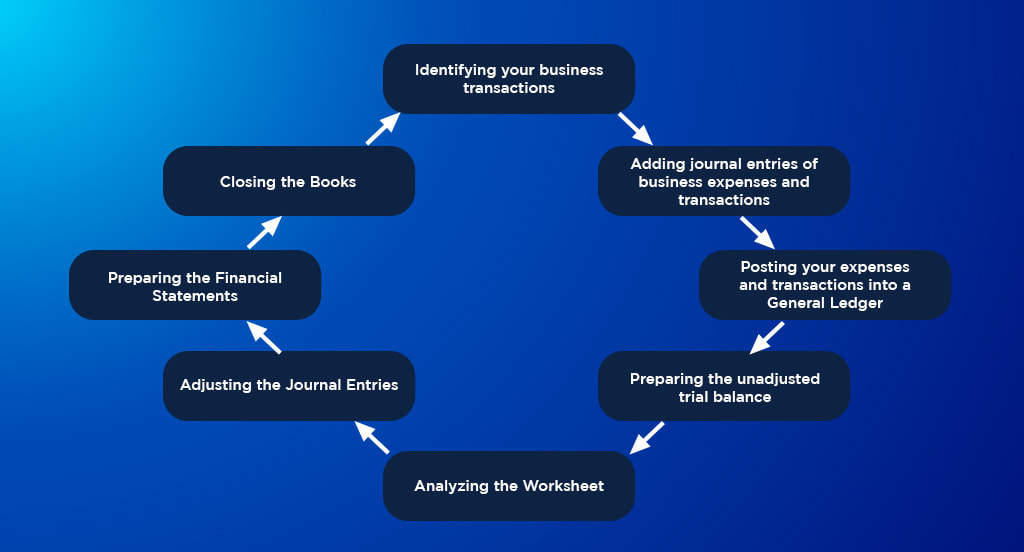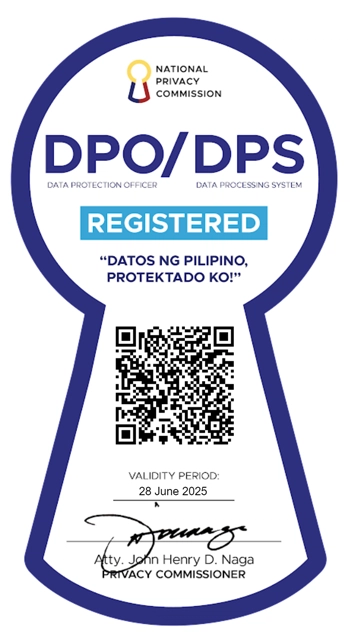8 Accounting Cycle Steps to Keep Your Business Up-to-Date

One of the most essential steps in any business is going through a series of financial activities that aims to record or keep track of the cash flow within the year.
As a business owner, it is highly important to keep track of these finances so that you can determine whether your business is profitable or which areas you need to improve in order to move your business forward.
This is where the accounting process is useful, as it helps business owners like you streamline your financial recording process.
An accounting cycle is a series of various steps that start with recording your current transactions in order to prepare financial statements.
This is a process that showcases the value of financial accounting in any business and that is to create insightful information as financial statements.
Simply put, the purpose of recording transactions and turning them into different presentations as balance sheets, income statements, and owner's equity is to give owners a financial aspect and outlook of their business. Continue reading to know what are the 8 steps in the accounting cycle.
Accounting Cycle's 8 Steps

An accounting cycle involves key eight steps that include not only recording journal entries but ensuring the data annually.
This means that when a company does this annually, it completes only one accounting cycle per year, whereas preparing quarterly means completing one accounting cycle every three months.
So what are the accounting cycle's 8 steps that need to be taken into consideration? Let’s do a thorough analysis of what each step is.
-
Identifying your business transactions
Sorting and looking into your business transactions is the first step in the accounting cycle.
Your accountant or the business owner would begin the accounting process by identifying business transactions made within a certain period.
This would usually involve sales, refunds, bills payments, supplier payments, and so on. This step is a vital one as it organizes your business expenses according to a specific category or event.
-
Adding journal entries of business expenses and transactions
The next step in the accounting cycle process involves recording each transaction as journal entries.
This is a process in accounting where businesses keep track of each sale or expense record by basing it on the receipt of an invoice, recognition of a sale, or completion of any other business transaction.
-
Posting your expenses and transactions into a General Ledger
The next step in your accounting cycle after the transaction has been recorded as a journal entry is that it should be posted to an account in the general ledger.
A general ledger keeps track of the breakdown of the accounting activities within a specific account.
-
Preparing the unadjusted trial balance
The trial balance usually ensures that the total debits are equivalent to the total credits in your financial records.
This accounting cycle process is done after the business posts journal entries into the individual general ledger books.
-
Analyzing the Worksheet
The next step, in the accounting cycle, is analyzing and identifying which journal entries should be adjusted.
The worksheet helps avoid any discrepancies and ensures that the debits and credits are always equal.
-
Adjusting the Journal Entries
This step is when the worksheet finds any correction that needs to be made within a certain period, adjusting entries made is a vital step to ensure the accuracy of your business’s financial records.
Adjusting a journal entry may accrue interest within a certain period, this can be in payables and other expenses that may have passed a certain period.
-
Preparing the Financial Statements
This accounting process happens once all entries have been adjusted.
The company now goes into the preparation of a trial balance and then followed by the actual formalized financial statements that are presented to key decision-makers of the business.
-
Closing the Books
The final step in the accounting process is to close the books.
This entails completing temporary accounting, revenues, and expenses within the accounting cycle period.
This process involves transferring net income into kept earnings.
The company or the accountant usually prepares a post-closing trial balance to ensure that all debits and credits match and that the business can start a new accounting cycle.
Optimize Your Accounting with the Help of Experts and Technology
The 8 steps in accounting cycle are very consistent in almost any kind of business and it is a time-consuming task that also requires the right amount of precision and accuracy as it determines the general health of the business.
The accounting cycle's 8 steps usually involve a lot of tasks that involve data entry and financial expertise.
Therefore, many companies and even small businesses today rely on technology in order to speed up the processor to find the right solutions and software that provide the company's additional help in ensuring that their accounting process is done in a timely manner.
Examples of these solutions involve electronic journals and ledgers, as well as automated software that can reconcile transactions to your business bank account.
However, sometimes the business not only requires the technology but experts in the accounting and bookkeeping process who can help strategize the best accounting cycle steps that can be useful for the business as it grows.
This is why businesses and even small companies look into acquiring additional help from accounting services firms with a pool of excellent bookkeepers and accountants, as it is more cost-efficient to have these onboard compared to having them in-house.
The flexibility of an outsourced accounting team is that your business will have a dedicated team to guide you through the accounting cycle process.
This will allow you to focus on other aspects of your business while ensuring that your finances are always on track.

Related Articles
Subscribe to our Newsletter
Get all our latest news, updates and exclusive offers delivered straight to your inbox.
Get all our latest news, updates and exclusive offers delivered straight to your inbox.
Get all our latest news, updates and exclusive offers delivered straight to your inbox.
Get all the latest CargoWise updates by subscribing to OBP's official newsletter.
Data Privacy Policy

Offshore Business Processing values, and respects the Privacy Rights of our Clients, Client's Customer, Business Partners, Contractors, Personnel, and other identifiable individuals or collectively "Individuals".
We are committed to protecting the privacy and confidentiality of Personal Data through adherence to our Data Privacy Principles and the implementation of reasonable and appropriate security measures to ensure fair, appropriate, and lawful processing.
Background and Scope
Offshore Business Processing as a global service provider goes beyond the borders of the residing countries. The global market requires not only the availability of communication, technology, and information systems but also the integrity and confidentiality of processing information including the Personal Data of Individuals that can be reasonably be determined from the information available.
This Data Privacy Policy sets the principles which emphasize the Offshore Business Processing's standard practices for the processing of Personal Data of Individuals. This Policy applies to all personnel and accredited 3rd party service providers who must act consistently with the principles contained in the policy. Domestic and industry-specific privacy statutory laws and regulations shall take precedence over this policy, to the extent applicable within the confines of conflicts of law principles.
Privacy Notice
This privacy notice describes the privacy practices for www.offshorebusinessprocessing.com. This applies to the Personal Information collected by this website. It will notify the user of the following:
- What personally identifiable information is collected from the user through the website, how it is used, and with whom it may be shared.
- What choices are available to you regarding the use of your data.
- The security measures in place to protect against the misuse of information.
How the user can correct any inaccuracies in the information.
Policy Changes on Websites
Any changes to our Data Privacy Policy and Privacy Notice will be made available on our website. If there are changes to how we treat our users' Personal Information, we will notify them via email or put a notification on our website.
The Personal Information/Data we hold about the users must be accurate and up to date. It is the responsibility of the users to ensure that Offshore Business Processing has up-to-date and accurate Personal Information and an active email address for your website update subscription.
What is Personal Information
Personal Information is any information whether recorded in a material form or not, from which the identity of an individual is apparent or can be reasonably and directly ascertained by the entity holding the information or when put together with other information would directly and certainly identify an individual.
Personal Information we collect on our website is First and Last Name, Email Address, Phone Number, and Company through our "contact us" page.
How and Why Do we Collect It?
Aside from our website, we obtain Personal Information in many ways including interviews, correspondence, by telephone and facsimile, by email, from your website, from media or publications, from social media, from other publicly available sources, from our website cookies, and third parties.
We collect your Personal Information for the primary purpose of providing our services to you, providing information to our clients, and marketing. We may also use your Personal Information for secondary purposes closely related to the primary purpose, in circumstances where you would reasonably expect such use or disclosure. You may unsubscribe from our mailing or marketing lists at any time by contacting us in writing.
When you visit our website, www.offshorebusinessprocessing.com, we automatically collect certain information about your device, including information about your web browser, IP address, time zone, and some of the cookies that are installed on your device. Click here to know more about our Cookies Policy. Additionally, as you browse the Site, we collect information about our web pages that you view, what websites or search terms referred you to the Site and information about how you interact with the Site. We refer to this automatically-collected information as "Device Information".
This website may include links to third-party websites, plug-ins, and applications. Clicking on those links or enabling those connections may allow third parties to collect or share data about you. We do not control these third-party websites and are not responsible for their privacy statements. When you leave our website, we encourage you to read the privacy notice of every website you visit.
Disclosure
Your Personal Information may be disclosed in some circumstances including the following:
- Third parties where you consent to the use or disclosure; and
- Where required or authorized by law.
Retention and Security Measures
Only authorized personnel has access to Personal Data and will be retained and disposed of in accordance with Offshore Business Processing's retention and disposal policies, guidelines, and applicable laws and regulations.
Offshore Business Processing implements appropriate and reasonable Technical, Organizations, and Physical Security Measures throughout the Data Life Cycle of the Personal Data that is collected. This involves preventing or at least reducing the probability of unauthorized/inappropriate access to data, or the unlawful use, disclosure, modification, and deletion to protect its confidentiality, integrity, and availability.
Quality of Personal Data and Access
It is important that Offshore Business Processing holds accurate, complete, and up-to-date Personal Data of identified Individuals. It is the responsibility of the Individuals to ensure that collected Personal Data is accurate, complete, and up-to-date. If the Individuals find that the Personal Data is outdated and inaccurate, they should advise Offshore Business Processing as soon as practicable so an update on records can be done and continued quality services will be provided.
Individuals may access, update and or correct the Personal Data by sending a letter of request subject to the approval of the management. Offshore Business Processing will not charge any fee for your access request but may charge an administrative fee for providing a copy of your Personal Data. To protect your Personal Data, we may require identification from you before releasing the requested information.
Contacting DPO
For questions and/or concerns regarding this Data Privacy Policy, use of your Personal Data, or your rights in relation to the Data Privacy Act of 2012, you may contact the Data Privacy Office in the following contact details:
Data Protection Officer
Email: dpo@offshorebusinessprocessing.com
Contact number: (+632) 7502-6411
Get all our latest news, updates and exclusive offers delivered straight to your inbox.
Get all our latest news, updates and exclusive offers delivered straight to your inbox.
Get all our latest news, updates and exclusive offers delivered straight to your inbox.
Get all the latest CargoWise updates by subscribing to OBP's official newsletter.
All Rights Reserved





